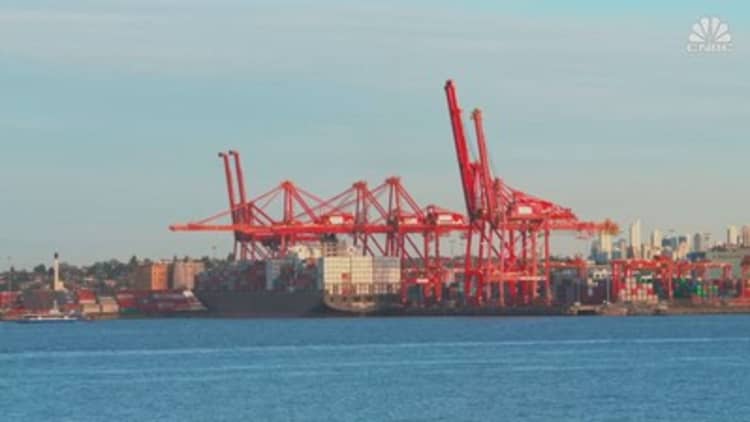Canada’s labor minister meets with provincial counterpart amid port strike

A container ship sits docked at the Port of Vancouver on November 20, 2021.
Justin Sullivan | Getty Images News | Getty Images
Canadian Labor Minister Seamus O’Regan met with his provincial counterpart, British Columbia Labor Minister Harry Bains, in Vancouver on Wednesday to discuss the country’s west coast port strike which has stretched into its fifth day.
Government sources told CNBC that O’Regan and Bains met to urge both parties to get together and find a solution.
When asked if the government is considering such a measure, the office of the Minister of Labor told CNBC: “We are not looking past the bargaining table, because the best deals are made at the table. Federal mediators continue to support the parties in their negotiations.”
Calls for government intervention have been circulating citing the May 2021 strike at the Port of Montreal.
This week, Alberta’s transport minister called on the federal government to recall Parliament to consider back-to-work legislation that would end the strike at British Columbia ports.
People familiar with the matter explained that because Canada’s Parliament is not currently in session members would have to be recalled, which would take several days. While remote voting is available, there would need to be a level of quorum in the room for the vote to happen.

On Tuesday, both the International Longshoremen and Warehouse Union and the British Columbia Maritime Employers Association said they were pausing negotiations — each blaming the other for the standstill.
Both the ILWU and BCMEA told CNBC they were each holding individual talks with the mediators.
The ILWU said in a statement the BCMEA “has deliberately sabotaged” the progress that was made on contracting out maintenance work.
The BCMEA said it remains “ready to come back to the table at a moment’s notice, assuming that ILWU Canada is prepared to put forward a reasonable proposal. We are looking to reach a fair and balanced deal so ports can open and goods can start flowing as soon as possible.”
Included in this labor strife are the ports of Vancouver and Prince Rupert which collectively process and move almost 20% of U.S. trade. Products ranging from critical auto parts like brakes are processed through those ports as well as additional auto and manufacturing parts, holiday items, and consumer goods.
An estimated $19 billion in trade is stranded off the ports of Vancouver and Prince Rupert as a result of the strike, a number that is expected to grow each day as more vessels bound for these ports are forced to anchor.
Charlotte Cook, senior trade analyst at VesselsValue, told CNBC, “Vessel transit and turnaround times are expected to increase as a result of the strikes and congestion looks to be mounting outside Vancouver, one of Canada’s main container ports.”




